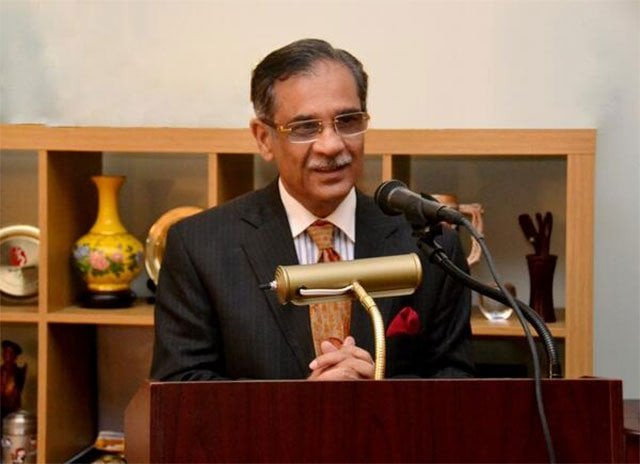CJP forms special bench to hear petition of IHC judge accused of misconduct
SC’s three judge bench, headed by Justice Azmat Saeed Sheikh, will take up case on October 18

Chief Justice of Pakistan Mian Saqib Nisar. PHOTO: FILE / EXPRESS
Headed by Justice Azmat Saeed Sheikh, the three-judge bench, comprising Justice Qazi Faez Isa and Justice Sajjad Ali Shah, will take up the case on October 18.
The development came a week after IHC judge Shaukat Aziz Siddiqui approached the apex court to request that he be given an open trial before the SJC.
Siddiqui filed a constitutional petition in the apex court on October 5 under Article 184 (3), making the council and the federation respondents.
IHC judge goes to apex court to request open trial
On May 18, the SJC had dismissed his plea seeking an open trial. The council was scheduled to resume hearing of the misconduct case in the first week of November wherein it would record evidences against him.
But the IHC judge’s 14-page constitutional petition requested the SC to declare that SJC’s May 18 null and void as it was passed without lawful authority.
Pleading the court to suspend the SJC proceedings against him till a decision is made on the petition, the judge also requested that the SJC be told that he has a fundamental right to insist that an inquiry into his conduct be conducted publicly.
The petition stated that the council’s May 18 order, by upholding paragraph 13 (1) of the SJC Procedure of Inquiry 2005, which permits the proceedings of the council in camera, violates Article 10-A of the Constitution, adding that Article 10-A provides every citizen with the right to a fair trial and due process.
Supreme Judicial Council looks into LHC judge’s misconduct
It further stated that the IHC judge had nothing to hide as his dignity was not compromised if the proceedings were held in camera. Likewise, it was stated that due process requires that a person must be given a reasonable opportunity to defend himself, adding that this was not guaranteed in a secret trial.


















COMMENTS
Comments are moderated and generally will be posted if they are on-topic and not abusive.
For more information, please see our Comments FAQ